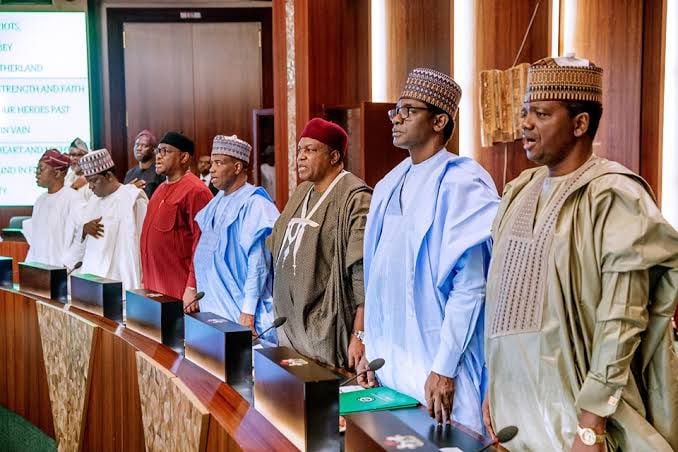Under the auspices of the Nigeria Governors’ Forum (NGF), the 36 State Governors have finalized plans for how to meet with the Independent Corrupt Practices and Other Related Offences Commission (ICPC) and the Economic and Financial Crimes Commission (EFCC) to discuss how to manage their states’ security votes.
The Federal Inland Revenue Service (FIRS) and the Central Bank of Nigeria (CBN) will also be present at the meeting scheduled on Tuesday, April 4th through virtual to deliberate on difficult issues involving security votes allotted to States.
The meeting will take place virtually on Tuesday, April 4, according to a statement signed yesterday by NGF Director, Media Affairs, AbdulRazaque Bello-Barkindo. The Director-General of NGF, Asishana Bayo Okauru, stated that the agencies expected to attend.
According to a statement signed yesterday by NGF Director, Media Affairs, AbdulRazaque Bello-Barkindo, the meeting will take place virtually on Tuesday, April 4 and that the Director- General of NGF, Asishana Bayo Okauru said that the agencies expected to be at the meeting include the Economic and Financial Crimes Commission (EFCC), the Independent Corrupt Practices and other related offences Commission (ICPC), the Federal Inland Revenue Service(FIRS) and the Central Bank of Nigeria (CBN).
Security vote is a monthly allocation given to state governments for improved security.
According to Wikipedia, “security vote in Nigeria is a monthly allowance that is allocated to the 36 states within the Federal Republic of Nigeria for the sole purpose of funding security services within such states.
“The monthly fund runs into billions of naira and vary based on the level of security required by the individual state.”
The statement read, “Governors of the 36 states of the federation are to meet with all the economic and financial agencies in the country, with a view to ironing out thorny issues surrounding their states’ security votes, towards establishing a better option of managing the funds.
“The meeting, which is to take place on Tuesday April 4, according to an invitation issued by the Director General of the Nigeria Governors’ Forum, Mr. Asishana Bayo Okauru, will be virtual, to ensure full attendance by all the relevant officers in the matter.
“Those invited to the meeting include the Economic and Financial Crimes Commission, EFCC, the Independent Corrupt Practices and other related offences Commission, ICPC, the Federal Inland Revenue Service, FIRS and the Central Bank of Nigeria, CBN.
“Furthermore, the meeting will also consider deepening the management and expansion of the cashless policy which took effect from the time of the redesigning of the national currency, the Nigerian Naira, last year, to further the financial inclusion of all citizens in the ensuing scheme of things, going forward.
“This meeting is called at the instance of the Nigeria Financial Intelligence Unit, NFIU, in its letter of 30th March, which was addressed to the Chairman of the NGF and signed by the NFIU Director, Modibbo Hamman Tukur.
“The letter said that apart from the facilities for national financial inclusion, it is also putting on the table the uniform development and cooperation on the national addressing and post code project, which will put Nigeria on the same pedestal as all advanced countries across the globe.
“Also on the agenda is a consensus on harmonizing and updating the national tax collection and business entry standards and its requirements to help respond to the FATF and the EU grey listing in which Nigeria appeared.
“All Governors are advised to prioritize the meeting as its contents had been discussed at the NGF emergency meeting of Thursday 30th March, where it was unanimously agreed that a meeting with the afore-mentioned agencies was imperative.”
Recall that over the years, whatever Nigerians have heard about the real amount being appropriated to state governors in Nigeria as security has remained a guess work, just as even those in the corridors of power, have described security votes as humongous amount of money that is spent by governors unaccounted for.
Wikipedia had noted that security votes have not been widely accepted by citizens, as most have claimed that such funds are being abused by the state governments, because how the funds are disbursed is not accountable to any agency.
According to Transparency International, Nigeria allocates an estimated N241.2 billion (about $670 million) to security votes annually.
The international governance and rights watchdog had decried Nigeria’s annual allocation to security votes, saying that it is more than the Nigerian Army’s annual budget, 70 percent more than the Nigerian Police Force annual budget, and far higher than the United States of America and United Kingdom’s security assistance to Nigeria.
Transparency International said that since 2012, the US has spent $68.6 million in security assistance to Nigeria, while the UK has given over $53.5 million (£40 million) in counterterrorism support to Nigeria from 2016 to 2020.
